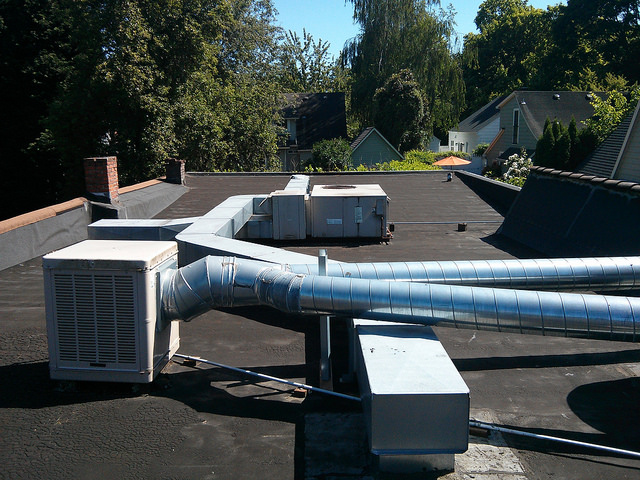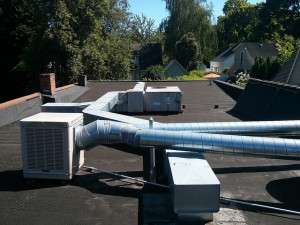
 Commercial air conditioning systems are an eyesore. Depending on the size of the building, you may not want to give up the amount of space that large HVAC units require. Rooftop HVAC units are packaged systems installed on rooftops that tie directly into a building’s ductwork. In addition to lower installation costs, rooftop HVAC systems offer more options and versatility than others found on the market.
Commercial air conditioning systems are an eyesore. Depending on the size of the building, you may not want to give up the amount of space that large HVAC units require. Rooftop HVAC units are packaged systems installed on rooftops that tie directly into a building’s ductwork. In addition to lower installation costs, rooftop HVAC systems offer more options and versatility than others found on the market.
Advantages of Rooftop Commercial Air Conditioning Systems
- Flexibility: Rooftop HVAC systems are modular units. This means that you can add to it if you expand or redesign the space. Furthermore, you can distribute the modules in different locations on the roof, if needed, depending on the building’s heating and cooling load requirements. When a building has multiple rooftop units, you can tailor the temperature settings for specific areas and track their energy usage.
- Less noise pollution: While many modern HVAC units are quieter than their predecessors, they still make a distinguishable noise. Roof-mounted commercial air conditioning systems are out of earshot, helping the building seem quieter.
- Increased security: Ground level HVAC units are at risk of vandalism and theft for individual parts. Rooftop systems eliminate the conveniences that would-be wrongdoers seek.
- Space savings: Land is a commodity. Rooftop units have all the heating and cooling components in a single package. This setup frees up space so you can use it for more attractive features, such as landscaping, extra parking or future building expansions.
- Minimize dirt and damage: Ground level HVAC systems are exposed to dirt, dust, organic debris and litter. Because of their elevated location, rooftop units tend to stay cleaner and safer from debris and accidental damage.
- Power choices: Rooftop HVAC units run on natural gas or electricity.
- Improved energy performance: Commercial rooftop HVAC systems come with energy-saving features or options that you can add to improve its performance. Those with variable air volume controls, for example, save energy with by meeting airflow demands with matching fan speeds. Economizing controls, such as dampers, use the outside air to cool a building when outdoor temperatures permit. During the summer, thermal wheels, or energy recovery wheels, decrease the cooling system’s load by transferring the heat and humidity in the supply airstream to the cooler and drier airstream in the exhaust. By using programmable thermostats in the building, you can adjust HVAC system’s operation according to seasonal changes and occupancy schedules.
- Ease of maintenance: Commercial rooftop heating and cooling units require professional maintenance at least once a year to reduce mechanical problems, ensure efficiency and prevent unnecessary wear and tear. When a commercial building has rooftop HVAC units, a technician has easy access to all the modules. There is no need for the professional to search for individual units throughout the property. He also does not need to enter the building to repair or maintain the equipment. Keep in mind that if you do not perform basic maintenance tasks on a monthly or quarterly basis (e.g., change the filters, check for leaks or clean the fins), you may need professional maintenance services more often.
Rooftop commercial air conditioning systems are not just simpler and less expensive to install; they enhance the building’s energy performance and comfort levels. AAA Heating and Cooling offers gas and electric rooftop HVAC systems, as well as rooftop heat pumps, designed to reduce operational costs and improve indoor air quality. From installation to maintenance and repair, AAA provides comprehensive HVAC services for all your heating and cooling needs. Contact us to learn more or to schedule an appointment.
[Photo from Ferrous Bueller via CC License 2.0]